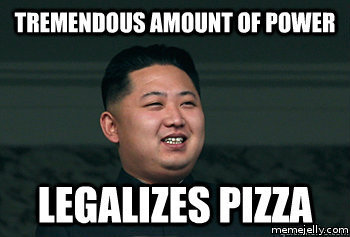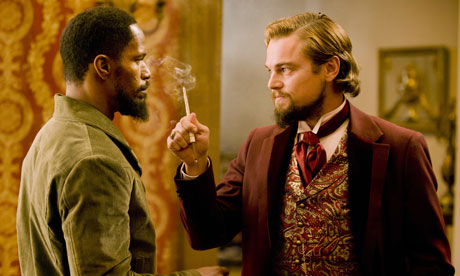Monday, 28 January 2013
Sunday, 27 January 2013
Les Miserables, Django Unchained and Spielberg's Lincoln all use and explore slavery. Why?
Les Miserables
Hugh Jackman plays prisoner 24601 who experiences nineteen years of punishment as a slave.
Django Unchained
Jamie Foxx plays a freed slave (Django) who is travelling with a German bounty hunter (Christoph Waltz) to free his wife from a plantation which partakes in negro slavery.
Abraham Lincoln
Daniel Day Lewis plays the historically prominent American president Abraham Lincoln who fights against slavery.
Before we delve into the shared theme of slavery in this years top 3 films, we must note that the stories in these films are based upon late 18th/ 19th century France (for Les Miserables) and America (for the other two). This period of human history witnessed the eclipse of slavery, the French revolution in 1848 and the thirteenth amendment installed by Lincoln around 1863 shut the doors on involuntary servitude.
After these revolutions, slavery still existed as a punishment for certain injustices but the idea of trafficking humans for free labor was seen as completely immoral and inhumane. The western world witnessed a major cultural shift in moral values. The freedom to govern oneself was legally and politically seen as an increasingly important principle in society. Racism, however, did not die out in America and many segregations formed.
We must also note that slavery is depicted slightly differently in each film. In Les Miserables it is shown in the opening scene and we are then introduced to 24601 (Jean Valjean) as a slave and convict. We witness him and many other prisoners who look exhausted, emotionally destroyed and hopeless partake in a monumental task. Slavery is portrayed as a punishment here, but it is still a cruel and life destroying process. Jean Valjean escapes his parole and stumbles upon a church where he comes to question his identity and then emancipates himself from his slave/convict past.
His unchaining from his past originated from introspection, ignited by a saint like gesture from a priest who treated Jean as an equal human being. Jean Valjean became determined to become something more, to become a better and humble man. The score and the singing create a great sense of pathos towards Jean Valjean and this plays a vital role in the relationship between him and the audience: throughout the film we know his past but at the same time we feel tremendous respect and love for him as a man who chose to better himself and others.
In Django Unchained, the main character Django has made a deal with a German bounty hunter Schulz as Django needs him to find his wife and Schulz needs him to find his bounty targets. Django is offered freedom and money.
Here slavery is seen fit for negros just because they are black, we get a strong sense that in Southern America negros are seen as inferior beings and therefore should not be granted the freedoms and respect as white Americans. We witness slavery as a cruel production line as in 'Candyland' where the slaves are treated disgustingly by the white farmer. We are reminded of the completely injustiable and cruel nature that existed in the slave trade.
However, as in Les Miserables, with great suffering and constraint there comes (after some trouble) emancipation. The motivation for Django's emancipation is love, he risks his life to become reunited with his wife. Tarantino portrays the battle between love and cruelty, which reflects that the slave traders were all wrong, negros do feel love and are human like everyone else (which is obviously true).
In Spielberg's highly anticipated Abraham Lincoln, the main protagonist is not a slave and is far from it. He is the 16th president of the USA. This completely contrasts the other 2 films. This means we get to see the topic of slavery from a political point of view and how it became fuel for electoral campaigns and debates. We see the intelligence and the rationale of Lincoln and the story that led to the thirteenth amendment which abolished slavery. Slavery is seen as a macroscopic trampling on the freedoms of black people and a great step towards the defeat of this destruction of freedom comes from the dedication, the moral integrity, the care for human nature and the inspirational charisma shown by the great Abraham Lincoln.
Why?
It might be that in this part of history lay great untold stories of love, freedom and political revolution which there seems to be (as it was an extremely important time for the West in terms of the progress of liberty). I think however, that slavery and how cruel, degrading and disgustingly tortuous it is strikes the core of our moral sentiments. We feel so strongly against inequality and oppression in our modern world as it was built upon the fight against it. The morality in our modern society has autonomy, democracy and equality at its heart and we feel such empathy for those who suffered at the hands of oppression. These films reach out for the strongest of our emotions and morals be it the hatred of cruelty, or the love and complete respect for those who help fight injustice. The stories told in these films remind us of the power of dedication for freedom, be it the freedom to love or the freedom to become who you want to become.
Oppression, racism, inequality and political unrest still exists in the modern world. It exists in North Korea, it exists in many countries such as Syria and Libya where rebels fight the system which has restrained their nation for too long.
These films, using the theme of slavery, will leave you reflecting on the importance of human rights and freedoms and will encourage you to deeply consider global unrest where the freedoms of humans are in peril.
Labels:
Abraham Lincoln,
Django Unchained,
freedom,
french revolution,
Hugh Jackman,
Jamie Foxx,
Les Miserables,
Lincoln,
New film,
Quentin Tarantino,
Racism,
slave trade,
slavery,
southern america,
Steven Spielberg
Friday, 25 January 2013
North Korea Threatens South Korea
The North Korean military intend to conduct nuclear tests which violate some of the conditions in the UN resolution, it should be noted that the legal status of the resolution is technically non-biding. However conducting nuclear tests at high level is a cause of concern for the rest of the world, especially the United States. The public relations for the NK government claim that the tests are not nuclear but concern a satellite orbit installation. Many deem this a lie:
North Korea says its rocket launch was for the sole purpose of putting a satellite into orbit; the US and North Korea's neighbours say it was a test of long-range missile technology banned under UN resolutions.- BBC NewsNorth Korea's behavior and determination to conduct these tests begs the question why they are even that concerned about military issues. There population is in poverty, they are one of the poorest nations on earth and their political system is deluded, primitive and rests on many many lies. They should seek help from the international world. The party and their leader are simply confused, they are all under a misguided spell set by earlier leaders that the rest of the world is out to get them. It is deeply worrying.
South Korea are under threats if they agree to the UN sanctioning. The North Korean department which deals with relations with Seoul said:
"If the puppet group of traitors takes a direct part in the UN 'sanctions', the DPRK [Democratic People's Republic of Korea] will take strong physical counter-measures against it,"The rest of the world would surely back South Korea to follow through with some of the sanctions and protect it against any NK attacks.
Indeed we are still witnessing a nation in complete isolation and lock-down which has not bought any good to its people. We are simply waiting for NK to open its doors or for them to attack and for us to retaliate. Either way, it will be a long time till anything significant happens.
Obama: North Korea, what have I told you about nuclear tests. Give that nuclear material now!!!
North Korea:
Saturday, 5 January 2013
Is the Eastern world playing catch up?
Cases
Freedom of Expression and Democratic Morale
The mustache brothers comedy group were imprisoned for 'taking the piss' out of the Burmese militia. They are satirical performers who perform in and around Mandalay, during the house arrest of San Suu Kyi they amused the press and outsiders with their political banter. The government prosecuted them for political crimes... they did not try and evoke a revolt against the government but the mere act of joking about the government is worthy of jail time. Let's not forget that jail in Burma is not pleasant.
Feminism, Equality and Identity
If you remember 'Unveiled Syrian Woman Goes Viral: http://newphysicistphi.blogspot.co.uk/2012/11/unveiled-syrian-woman-goes-viral.html' which featured Dana Bakdounis, a Syrian feminist who publicly unveiled her religious clothing in an act of dissent to the established order. This was a public cry... neigh... a public rising for women and the cracking of the Muslim based patriarchal society. This stirred a media frenzy in Syria which is already encumbered by political rebellion.
Unsatisfactory Law, order, policing and human respect
'what ever happens to them [women] is their own fault'
if they are not escorted around by men. This begs the question... are you really leading a safe and female friendly environment? What needs to change is the 'male dominance' i.e. some victims of rape are blamed rather than the males who physically abuse the women. This makes no sense. This society is based on a traditional notion that men are the providers, rulers and guards of the territory. This is simply wrong, there is no evidence for the religious notions that men hold more power or rights. Just because men a slightly stronger physically (on average) does not give them the right to govern females or even homosexuals.
What is the general cause for all this strife in the Eastern world?
Tradition is a very general term but it does embody the general origin of the recent and prolonged political problems in the Eastern cultures. The Muslim religion plays a huge role in Eastern culture, the Chinese, Japanese and Thai have slightly different spiritual and religious orientations and these play a smaller role in their governments.
It is the adverse interpretations of an unjustified heap of scriptures which then mixed with political power and corruption lead to some awful political structures. Iran, Egypt, Syria, Libya and Iraq have all and are still experiencing political rebellion, corruption, female degradation and economic instability. They need to rationalize their law, economic spending and allow the media to snoop around police and governmental officials. Allowing the media to be free will highlight corrupt officials, show the public opinion and stimulate debate. Sharia law is mainly based on the Ku'ran and contains death penalties and public stoning of women who are seen with skin showing, adultery and any crimes against Allah etc. The principles of equality, freedom of expression and freedom of any church or religion should be installed within these cultures. Why? Why should they adopt these seemingly Western values? Well they work and the people... especially females are in need of an equal footing legally and politically. They work because they provide everyone with the same freedoms, no one has disadvantage or advantage over anyone else (ignoring wealth... which again is an issue but only if the education system fails to accommodate and provide opportunities for less well off children. Freedom expression works intellectually, it allows information to be exchanged freely between anyone. It allows people to argue, debate and to challenge each other. If this is mixed with the ability to reason and to use evidence in the right way this could help a society become smarter. Freedom from the church and other religions makes the law unbiased to any one view, religion is based on interpretation and faith. When you are dealing with jail sentences, court cases and sometimes even death you need to use the most objective tools you can... otherwise what you call just is not objective or justified.. it would be subject to opinion. Hence the use of logic, science and evidence come into play in the legal system.
It is the upbringing of children who are bought up in a traditional conservative and even extremist and fundamentalist way which can lead to a conservative society which by mere tradition would rarely change their culture. The people will be less open to challenging their views or taking an objective approach to morals, politics, people and even truth itself. Indoctrination and conservatism are by nature stubborn. If religion is taken out from the law and government it would take away the corruption of religion, it would give less power to those possible extremists and fundamentalists who are reluctant to give females equal rights etc.
Economically, Japan and China are doing okay at the moment. India is on the rise. In order to create stability within Eastern economies first there needs to be a stable government, as civil wars and protests greatly deter foreign investments and future plans for the country.
North Korea of course is the extreme of totalitarianism. It's 'religion' is not out of this world it is basically the monarchy. It is playing catch up to Hitlers and Stalin's world view... that complete dictatorship and control is not productive and it is not morally justifiable. North Korea is full of poverty and low GDP, health is bad, education is basically indoctrination. It is not, even today, in contact with many countries... it has not been truly integrated with the internet. :o
The Western world is not perfect... HELL NO. However many EU countries and America have made the steps of relinquishing the power of religion in the government and law (America less so now with the gay marriage debates and general increase in homophobia, religious fundamentalism) which have led to a fairly equal law between women and men. Women have more rights in the Western world than in the Eastern fact. They can wear what they like, be what they like (now even a bishop?). Freedom of expression has flourished for better or for worse in the UK and the states and many EU countries. The film, news and newspaper industries hold a lot of power in communicating with most of the populations and debating the governments decisions etc. are encouraged.
Female respect still needs to increase here, I think an increase in sexist comedy is an actual good sign with sites like the Lad-Bible and stand up comedians as this for me highlights that it is not taken seriously anymore. There are of course lines such as rape jokes etc. which could incite violence or extreme offence.
I wonder how long it would be before any woman could wear anything she wanted anywhere in the world without inciting heresy or breaking a law (of course the religion would have to be taken less seriously).
So is the Eastern world playing catch up? Yes but only on a few matters, it just happens that these matters are pretty important and highlight a revolutionary step in political evolution.
Labels:
Burmese comedians,
Dana Bakdounis,
eastern world,
economics,
freedom,
fundamentalism,
identity,
india rape,
indoctrination,
Iran,
Iraq,
Libya,
mustache brothers,
politics,
progression,
religion,
revolution,
Syria
Subscribe to:
Posts (Atom)

















